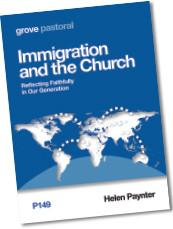Migrancy and the UK: three areas to consider
Baptist theologian Helen Paynter has written a short booklet exploring the Church's response to immigration. In introducing it here, she offers three areas for reflection that may help broaden our understanding of such a complex issue
 In February last year, I made a short visit to the Calais ‘Jungle’ (pre-demolition), and the Dunkirk refugee camp, as part of an aid-delivery and fact-finding delegation (pictured). I was appalled at the living conditions I witnessed, which included risks from fire, disease and violence.
In February last year, I made a short visit to the Calais ‘Jungle’ (pre-demolition), and the Dunkirk refugee camp, as part of an aid-delivery and fact-finding delegation (pictured). I was appalled at the living conditions I witnessed, which included risks from fire, disease and violence.
In particular, the predicament of unaccompanied minors disturbed me. (My full report, written on my return, can be found here)
Since then the migration situation across Europe has only intensified. We all recall the surge of public interest and sympathy following the tragic death of little Alan Kurdi in September 2015.
But thousands of people of all ages have died on the perilous Mediterranean crossing since then. As I write, 2,361 people have been documented as either dead or missing on that migration route this year.
Last month, I was privileged to spend Eid with a Syrian refugee family in Beirut in their current home – a windowless garage. They told me of their struggles with employment, healthcare and education, but most of all of their homesickness for Syria. Staggeringly, Lebanon currently accommodates an estimated 2m Syrian refugees, out of a population of around 6m (which also includes around 2m Palestinian refugees). Most of the Syrian refugees are living in such makeshift accommodation, and some in camps. The Palestinians – now often third-generation immigrants – are mainly in camps.
Broadening our consideration to migrancy in general, it is clearly a complex issue with multiple causes and no easy solutions. On the one hand are millions of desperate, needy, traumatised people. And also – rightly or wrongly – some who would like to take advantage of benefits, healthcare and job opportunities not available in their country of origin.
On the other hand, the UK is currently in a time of austerity, when affordable housing is increasingly difficult to obtain, and when NHS resources are genuinely stretched. Ours is a very multicultural nation, and while in many places diversity is celebrated – such as in my own home city of Bristol – in some places and at certain times, this has resulted in tensions and occasional civil unrest.
But the more that I think about this situation, the more I am convinced that migrancy is not just a ‘problem’ for us to ‘solve’, even benevolently. A better approach would be for us to understand it as a situation in which we in Britain are already enmired, whether we engage with it or not.
-
To what extent has our own foreign policy – whether in the recent or more distance past – contributed to the current instability which is driving people from their homes? Better historians than I will be able to contribute helpfully to this debate, but the Sykes-Picot agreement which partitioned much of the Middle East, indifferent to the distribution of various diverse people groups, would seem to me to be a prime such example.
-
Another question to consider is the extent to which the situation places an ethical imperative upon us. Is it acceptable, for example, to regard migrant deaths which occur near but not inside our borders as ‘someone else’s problem’? To what extent do diplomatic and other efforts to reduce the emigration of refugees from troubled regions absolve us of any responsibility for those who have already travelled and are at our door? This argument was used by my then MP when I contacted her about unaccompanied minors a few months ago.
-
A third area to think about is whether we are really able to hold the moral high ground when it comes to so-called economic migrancy. The tabloid newspapers trumpet about greed and envy, but what is the difference between these and the much more acceptable characteristic of aspiration? And isn’t aspiration, and indeed envy, the very basis of our capitalist society?
This situation has been disturbing me for some years now, and I have attempted on a number of occasions to articulate some thoughts on the matter. Some of my earlier reflections can be found here.
 Most recently, however, I have developed some of the above questions in a Grove booklet Immigration and the Church: Reflecting Faithfully in our Generation.
Most recently, however, I have developed some of the above questions in a Grove booklet Immigration and the Church: Reflecting Faithfully in our Generation.
In this slim publication, I aim to offer a handful of models for understanding and reflecting theologically on some of the pressing issues that global migration presents. I don’t pretend to offer answers, but I offer these thoughts as a contribution to the ongoing debate, and I welcome dialogue on the subject.
May our generation not have to answer to the charge of indifference, either in the court of the future, or the judgment of heaven.
The Revd Dr Helen Paynter is Research Fellow and Co-ordinator of Community Learning at Bristol Baptist College
Visit the Grove website to buy Immigration and the Church: Reflecting Faithfully in our Generation (£3.95)
Baptist Times, 25/07/2017